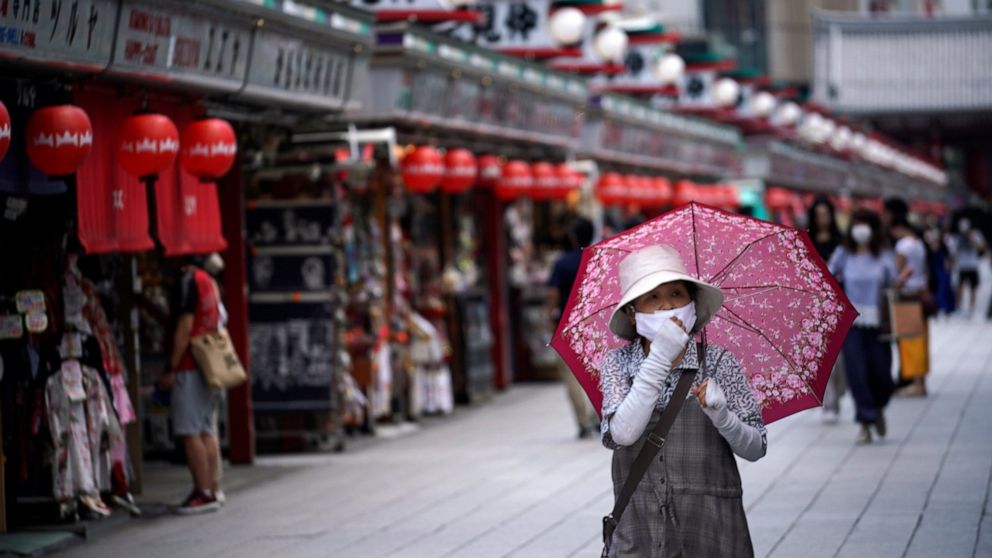Retail sales look to recover; nations eye economic concerns
Party City’s first-quarter sales fell 19% as it dealt with temporary store closures
By
The Associated Press
June 12, 2020, 5:45 PM
4 min read
4 min read
The outbreak of the coronavirus has dealt a shock to the global economy with unprecedented speed. Following are developments Friday related to the national and global response, the work place and the spread of the virus.
————————————————————————
EARNINGS RESULTS:
— Party City’s first-quarter sales fell 19% as it dealt with temporary store closures. Its North American online sales dropped 15.4%. However, when adjusted for curbside pickup and delivery and buy online/pick up in store, the figure declined 6.9%.
CEO Brad Weston said Friday that the company has an agreement with some bondholders to support a set of transactions that would lower its debt by more than 25% and raise approximately $100 million in new capital, if consummated.
Party City currently has more than 85% of its stores reopened.
— Hooker Furniture’s fiscal first-quarter sales dropped 22.8%, according to preliminary estimates. The company said the declined was driven by the COVID-19 pandemic, economic shutdown and stay-at-home orders throughout the U.S.
Chairman and CEO Paul B. Toms said orders fell more than 70% in March and about 65% in April. However, those numbers have started to improve as stores and the economy reopens. In May, order declined approximately 7%.
“We believe there are several positive factors in play such as pent-up demand, more focus on home environments and less competition for discretionary consumer spending from travel, eating out and other activities,” Toms said.
TRAVEL:
— American Airlines expects its second-quarter revenue will be down about 90% due to a drastic dropoff in travel demand. The airline said in a regulatory filing that it also anticipates total system capacity will be down approximately 75% for the period.
Still, American Airlines says bookings have shown continued signs of improvement since the first week of May. The company’s June occupancy level was 62% as of Monday, up from 47% in May.
— Three airlines have launched legal action against the British government, describing the country’s plan to quarantine most incoming travelers as “flawed.’’
British Airways, easyJet and Ryanair said in a statement Friday that the quarantine will have a “devastating effect,’’ on tourism and the wider economy. The airlines want the government to re-adopt its previous quarantine policy, where quarantine was limited to passengers from “high risk” countries.
Quarantine measures imposed this week stipulate that all passengers — bar a handful of exceptions like truckers or medical workers — must fill in a form detailing where they will self-isolate for two weeks. The requirement applies regardless whether they are U.K. citizens or not, and those who fail to comply could be fined.
CENTRAL GOVERNMENTS & BANKS:
— A prominent U.S. economist says there can be no real economic recovery in Europe unless governments “completely suppress” the coronavirus.
Columbia University Professor Jeffrey Sachs says Europe needs to articulate “more clearly and coherently” a continent-wide COVID-19 suppression strategy and how to safely get travel started again. The economist championed heavy investment in wind, solar and other low carbon technologies to achieve “real recovery.”
— Japan’s parliament approved a 32 trillion yen ($300 billion) second supplementary budget Friday to help fund 117 trillion yen ($1.1 trillion) in measures to soften the blow to the economy from the virus outbreak.
The extra funding includes support for small businesses, including programs to finance their rents and to adjust employment. It will also pay for measures to help prepare for possible future waves of infections, including development of vaccines and treatments for COVID-19.
— Official figures show that the British economy shrank by a colossal 20.4% in April, the first full month that the country was in its lockdown.
The Office for National Statistics said Friday that all areas of the economy were hit, in particular pubs, education, health and car sales. April’s decline follows a 5.8% contraction in March. In April, the economy was about a quarter smaller than it was in February.
MARKETS: Stocks rose broadly on Wall Street Friday, recouping some of their losses a day after the market had its biggest rout since mid-March.
![]()


